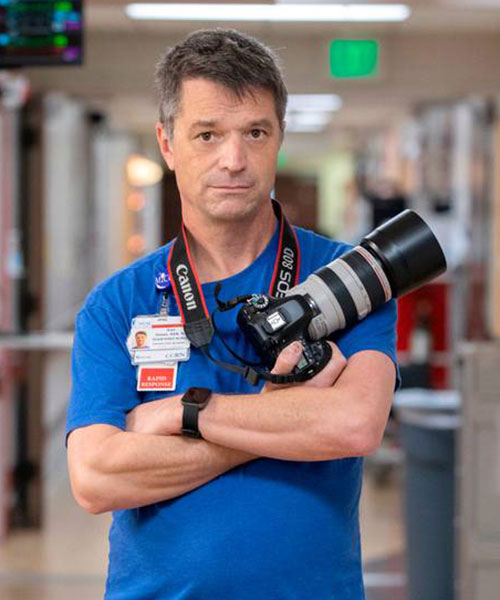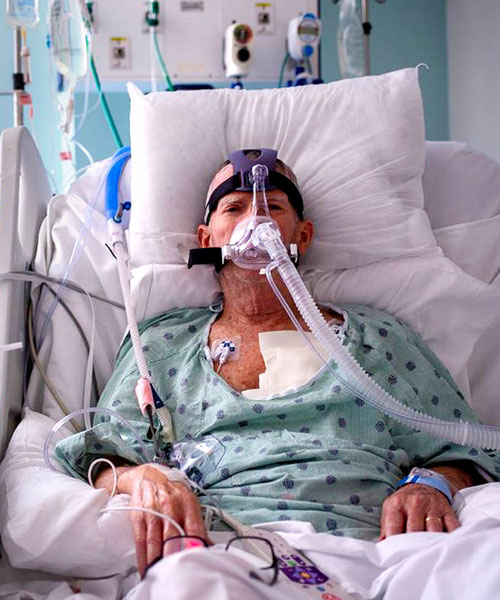‘I want the world to see.’ How a South Carolina nurse showed the nation the COVID crisis up close
It was another especially awful day inside the COVID-19 unit at the Medical University of South Carolina in Charleston. Another patient was dying from the coronavirus, and now another health care worker had to make the dreaded call. Alan Hawes, a registered nurse who made the leap into nursing in 2011 after more than two decades working as a newspaper photojournalist, clutched his camera as the inevitable came into focus.
He watched from across the room last fall as his colleague in the medical intensive care unit, Andrea Crain, picked up the phone and told a patient’s wife that she needed to get to the hospital. Her husband was dying from COVID-19, and there was nothing more they could do. She needed to come quickly. She needed to come to say goodbye.
This is the devastating reality of the coronavirus pandemic in South Carolina. Hawes said he just wanted the public to be able to see it. On Tuesday morning, both Hawes and his photographs from inside MUSC’s COVID unit made their national TV debut in a story that aired on “CBS Mornings.” “This whole pandemic affects all of the medical workers that work in these conditions and it’s not just, you know, about the PPE (personal protective equipment) and the high patient load, but it’s the emotional load that we carry as well,” said 52-year-old Hawes. “I want the world to see.” After Crain hung up the phone that day, she burst into tears. Hawes had watched the entire scene unfold and captured the moment when his colleague broke down at the nurse’s station.
She wept for Joel Croxton, a 72-year-old patient who was fully vaccinated and boosted but still succumbed to the virus on Sept. 14. Crain had been calling his wife, Sandy. “That day, she told me she was so tired of seeing all this death,” Hawes said. The photograph of the weeping nurse is just one of the images Hawes has taken since he began documenting the human toll of the coronavirus. But it is his vantage point from inside the hospital that gives the public a rare glimpse into how the coronavirus pandemic is impacting patients, the people who love them and the people who are trying to save their lives.
“Nurses are broken right now, emotionally,” Hawes told CBS News correspondent David Begnaud. “Are you?” he asked. “I feel like I am, yes,” Hawes responded. Before the segment aired, Hawes told The State newspaper he had hoped that these photos and this story on a national news network would save some lives. “And I hope that they don’t cause pain,” Hawes said, as he thought about the family members who might see images of their loved ones broadcast across the country. “But if I can get the word out and hopefully save some lives with these pictures, then that will cause a lot less pain.”

Photo: MUSC

Photo: Alan Hawes
He thinks back to 72-year-old Croxton, the patient who Hawes said did everything right. He got vaccinated. He got his booster shot. And Croxton was also one of the first patients to sign a waiver and participate in this photo project. “He just had a weakened immune system. So someone had to have given it to him. You don’t just get COVID from living, so at some point, it was transmitted to him,” Hawes said.
In one of the photos Hawes took, Croxton is sitting in a hospital bed with a BiPap mask across his face to help him breathe.
But Hawes can’t forget his eyes. “He’s just looking into the camera. He just looks scared to me, and it’s almost like he knows there’s nothing he can do,” Hawes said. “He’s just looking into the camera like, ‘Help me.’ But there was nothing we could do. We knew he wasn’t going to make it.” A few days later, Croxton died. His wife made it in time to say goodbye, to hold his hand, to pray with him with a hospital chaplain over an iPad being held by his nurse. “That was a really hard picture for me to look at,” Hawes said, his voice catching in his throat. Hawes said it took a year and a half to convince the hospital to greenlight the photography project. He told CBS News that they finally said “yes” when he sent his request with the subject line “Public Service Project.”
“His images showcase the harsh reality of COVID-19, and it is a privilege for Hawes to represent MUSC to a national audience,” said Carter Coyle, a hospital spokesperson. But the images have also been a morale boost, too. Unlike his photojournalism days, Hawes said family members, patients and his fellow health care workers are grateful when they see him snapping pictures in the intensive care unit. “Thank God someone’s here to show what’s going on,” people have told Hawes on multiple occasions. The photo project, like the pandemic itself, is far from over.
With the omicron variant sending more patients back to hospital intensive care units and emergency rooms, Hawes said he has picked up his camera again. As of Monday, the number of COVID-19 inpatient hospitalizations at MUSC’s downtown Charleston campus was 161. On Dec. 21, there were just 13 inpatient hospitalizations for COVID. But Hawes said he will be there, documenting whatever comes next.
Caitlin Byrd covers the Charleston region as an enterprise reporter for The State. She grew up in eastern North Carolina and she graduated from UNC Asheville in 2011. Since moving to Charleston in 2016, Byrd has broken national news, told powerful stories and documented the nuances of both a presidential primary and a high-stakes congressional race. She most recently covered politics at The Post and Courier. To date, Byrd has won more than 17 awards for her journalism.
Read more at: https://www.thestate.com/news/coronavirus/article257673048.html#storylink=cpy
